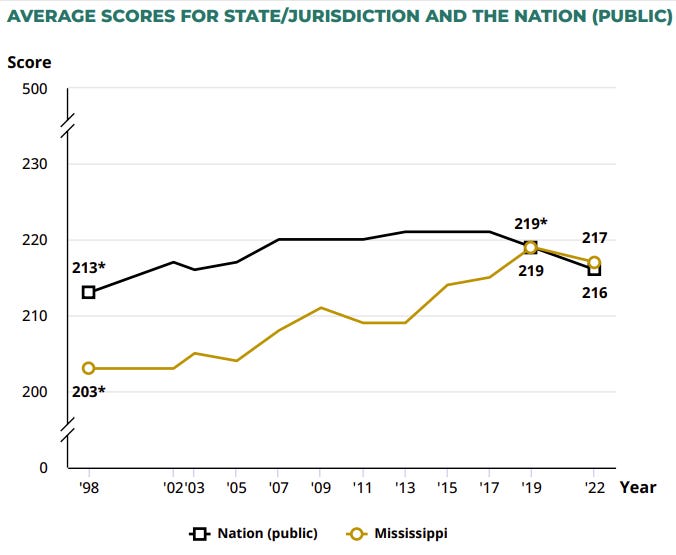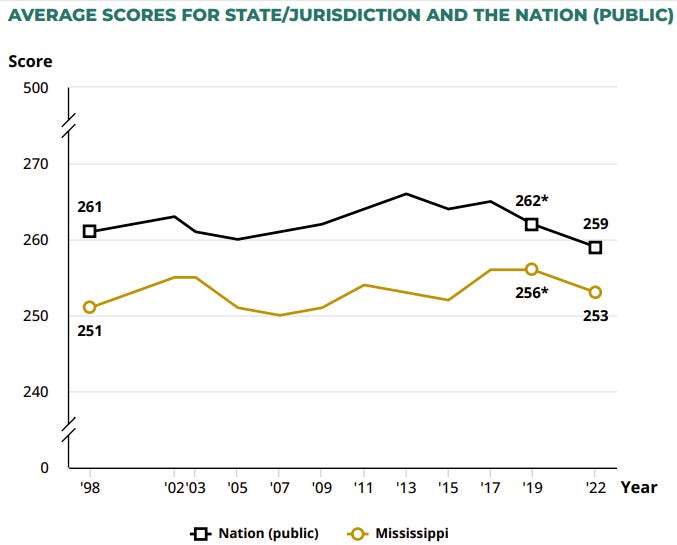The first month of any legislative session in Mississippi is usually not very indicative of what we can expect from state legislators in Jackson. The legislature generally comes out hot by fast-tracking one high-priority issue—in this year’s case, a plan to eliminate the state income tax, which passed the House earlier this month—but legislative deadlines do not require committees to begin voting on bills until early February.
But there are signs if you look close enough.
To start, a few key committees (including House Education) got a head start on passing legislation this week. And although it is generally a fool’s errand to read too much into the over 2,000 bills that have been filed (the vast majority will never see a vote), bills that have been authored by a committee chair or vice-chair are usually worth paying attention to—these are the folks who decide which bills do or don’t get a vote.
Based on what I’ve seen in the past week, here are some issues—and some specific bills—we can expect action on in education this year:
The Ten Commandments
In 2024, Louisiana gained national attention by passing a law requiring public schools to display the Ten Commandments in every classroom. Despite (or perhaps because of) a series of immediate court challenges, Mississippi legislators are signaling they want to follow suit by passing a similar law.
Certain Mississippi legislators are known to invariably file “culture war” legislation1 each year, and many of these bills often go nowhere. But there a few signs that a version of this law may gain traction. To start, there are already four separate bills to require display of the Ten Commandments in public school classrooms (and another bill to “permit” the display). Most tellingly, one of these bills (Senate Bill 2172) was filed by Dennis DeBar, who is chair of the Senate Education Committee. If he wants to bring SB 2172 up for a vote, he will do that.
Expanding the “Mississippi miracle” to middle school
I’m not a big fan of the term “Mississippi miracle.” Mississippi 4th graders made historic gains in literacy over the past decade, but these gains were no fluke—they were the result of intentional public policy, namely the 2013 Literacy-Based Promotion Act (LBPA). While the LBPA is most well-known for a provision that requires students to repeat 3rd grade if they don’t meet certain literacy benchmarks, the law also requires a series of supports and interventions to ensure that early elementary students are on track to be readers (here’s a great summary from my former coworker at Mississippi First, Grace Breazeale).

The only problem is that the LBPA is laser-focused on the years leading up to 4th grade. After 4th grade, the status quo remains. And so, while we have seen superb gains in 4th grade reading proficiency (bucking national trends), 8th grade scores have actually been falling (mirroring national trends).

This is evidently on the mind of a large group of House Democrats that filed House Bill 857, which seeks to expand some of the efforts outlined in the LBPA to students in grades 4-8 as well. On Wednesday, the House Education Committee passed HB 857 unanimously. The bill still has a long way to go before becoming law, but I imagine that Mississippi legislators will be keen to build on one of the few areas where Mississippi has become a national leader in education. Keep an eye on HB 857.
School choice
“School choice” is a loaded term, and it’s important to differentiate between the three different categories:
Public school choice (making it easier for students to transfer between public school districts)
Private school choice (providing public dollars for students attending private school)
Charter schools (schools that exist apart from traditional public school districts, but are still free and open to all local students)
Although we have yet to see action on any of these bills, Rob Roberson, who is chair of the House Education Committee, has filed legislation for each category of school choice (other influential lawmakers have also filed similar bills). I think it’s possible we see at least one brought up for a vote (albeit with amendments) in the coming weeks.
The first bill I’m following is House Bill 1433, dubbed the “Mississippi Quality Desert Education Enrollment and Transfer Scholarship Act” (QDESA). I’m not going to read too much into details here (something this controversial will likely see amendments if it’s going to get passed), but the general idea is to allow a hypothetical student in a school or district with a “D” or “F” rating to more easily transfer to another school district (public school choice) as well as provide state dollars if that student transfers to a private school (private school choice).
The second bill I’m following is House Bill 1432, which would make a series of revisions to the existing Mississippi Charter School Act of 2013. Most of these revisions are not terribly substantive, and would primarily impact how the state’s 10 existing charter schools are administered by the Mississippi Charter School Authorizer Board (MCSAB, the state agency charged with authorizing charter schools).
But there are some substantive revisions. To start, HB 1432 would allow charter schools to open in any public school district with a “D” or “F” rating at any time in the past five years. This is a big deal because, under the current law, charter schools can only open in a district that is currently rated a “D” or “F”—and the number of “D” or “F” districts has declined precipitously from 42 in 2019 to just five in 2024.2
More significantly, HB 1432 paves the way for additional charter school “authorizers” (currently, MCSAB is the only entity with the power to “authorize” the creation of a charter school). HB 1432 does not explicitly permit the creation of additional authorizers, but it does, curiously, change any existing reference in state law of “the authorizer” to “an authorizer”—and also permits charter schools to switch from one authorizer to another (a separate bill, House Bill 760, would explicitly permit additional authorizers).
In recent years, MCSAB has come under fire from charter school advocates for not authorizing enough charter schools. The idea behind multiple authorizers is to create an avenue for additional charter schools, presumably with different standards for opening and operating a charter school.
College access
College access advocates have for years been attempting to reform state financial aid in Mississippi in order to improve postsecondary attainment. There are currently three state financial aid programs:
MTAG: $500-$1,000 annual awards for any full-time student with a minimum ACT of 15 and GPA of 2.5 (provided that the student is not eligible for a federal Pell Grant)
MESG: $2,500 annual award for full-time students with a minimum ACT of 29 and GPA of 3.5
HELP: Tuition + fees for full-time students with a minimum ACT of 20 (provided that family income is $39,500 or less)
As it stands, the big losers are part-time students and low-income students with average test scores, neither of whom are eligible for any state financial aid (the average ACT score in Mississippi is 17.5, meaning an “average” student would not qualify for MESG or HELP).
Proposals for reform have differed somewhat over the years, but this year the chair of the House Universities & Colleges Committee, Donnie Scoggin, filed House Bill 628, which would expand MTAG to include both part-time students and low-income students—thus expanding eligibility for state financial aid by tens of thousands of students (a similar bill in 2024 was estimated to expand eligibility by 37,000 students). On Wednesday, the House Universities & Colleges Committee passed HB 628, which now goes to the House Appropriations Committee.
Teacher compensation
Compensation for Mississippi public school teachers is at a crossroads in 2025.
On one hand, the legislature may be gearing up to slash retirement benefits for any teachers (and other public employees) hired after June 30, 2025. I have previously written about what this “Tier 5” proposal could mean for teachers (a cut of over $400,000 over the course of a 20-year retirement for a 30-year teacher)—as well as what it means for taxpayers (“Tier 5 won’t lower your taxes”). While the final details of “Tier 5” have yet to be seen, Senate Bill 2439 opens the relevant code sections and will allow legislators to make potential changes later this session. SB 2439 has been referred to the Senate Rules Committee, where it awaits a vote.
On the other hand, influential lawmakers have filed legislation that would improve teacher compensation—namely, teacher salaries and the State Health Plan. In particular, Kent McCarty, the vice-chair of the House Education Committee, has introduced House Bill 1138 (which would provide a $2,000 salary supplement to teachers in critical shortage areas), House Bill 1137 (which would provide a $4,000 supplement to National Board-certified teachers in critical shortage areas), and House Bill 1135 (which would reduce premiums for dependents on the State Health Plan by 50%, saving teachers up to $5,256 in annual pre-tax income). While none of these bills have been brought up for a vote yet, they would have huge implications for teacher compensation at a time when over two-thirds of Mississippi school districts are classified as critical shortage areas. I’ll be watching each closely.
Next steps
The next big legislative deadline is that committees have to “report” (i.e., vote) on bills by Tuesday, February 4. With a few exceptions, any bill that isn’t reported by that date is dead. That means we’ll have a much better idea of this year’s agenda over the next two weeks.
In addition to a few in-depth posts on specific issues, my goal is to provide a general legislative summary of education bills each week. If that’s something you want in your inbox, please go ahead and subscribe to Policy Classroom—and please spread the word by sharing with anyone else who may be interested.
Thanks for reading. Stay tuned!
My definition of “culture war legislation” in education is any bill that is more concerned with imposing values than with increasing student achievement.
Technically, charter schools can open in a district with an “A,” “B,” or “C” rating, but they need permission from the local school board. That permission has never been granted in Mississippi.



